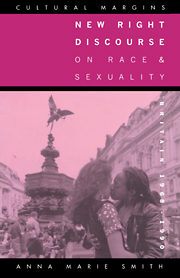Book contents
- Frontmatter
- Contents
- Acknowledgements
- Introduction
- 1 Thatcherism, the new racism and the British New Right: hegemonic imaginary or accidental mirage?
- 2 Derrida's ‘infrastructure’ of supplementarity
- 3 Separating difference from what it can do: nihilism and bio-power relations
- 4 Powellism: the black immigrant as the post-colonial symptom and the phantasmatic re-closure of the British nation
- 5 Thatcherism's promotion of homosexuality
- Conclusion
- Notes
- Bibliography
- Index
4 - Powellism: the black immigrant as the post-colonial symptom and the phantasmatic re-closure of the British nation
Published online by Cambridge University Press: 17 August 2009
- Frontmatter
- Contents
- Acknowledgements
- Introduction
- 1 Thatcherism, the new racism and the British New Right: hegemonic imaginary or accidental mirage?
- 2 Derrida's ‘infrastructure’ of supplementarity
- 3 Separating difference from what it can do: nihilism and bio-power relations
- 4 Powellism: the black immigrant as the post-colonial symptom and the phantasmatic re-closure of the British nation
- 5 Thatcherism's promotion of homosexuality
- Conclusion
- Notes
- Bibliography
- Index
Summary
Essentialist identity claims always betray themselves and ultimately remain impossible, but they nevertheless can have tremendous material effects in specific historical contexts. The Powellian construction of an essentially racist conception of Britishness in the post-colonial 1960s is a case in point. A traditional ‘history of the referent’ approach to Powellism would place Powell's anti-black immigration campaign within a more or less unified tradition of similar campaigns, and would take the meaning of terms such as the ‘black immigrant’ for granted. In my analysis, I shall attempt instead to draw out Powellism's genealogical precedents, its historical specificity and the ways in which it laid part of the foundation for Thatcherism. I shall focus on questions pertaining to the representational structure of Powellism. If de-colonization amounted to the traumatic loss of a necessary supplement, like the loss of a vital body part, then Powell's representation of the Empire as an accidental irrelevance amounts to a strategic suppression of the trauma.
The term, ‘immigrant’, is defined in the Oxford English Dictionary simply as ‘one who or that which immigrates; a person who migrates into a country as a settler’. The Webster's Dictionary entry reiterates this basic definition, but then adds that the immigrant is ‘not previously known’ in the new habitat. It defines ‘immigrant’ as ‘one who immigrates; a person who comes to a country to take up permanent residence; a plant or animal that becomes established in an area where it was not previously known’.
- Type
- Chapter
- Information
- New Right Discourse on Race and SexualityBritain, 1968–1990, pp. 129 - 182Publisher: Cambridge University PressPrint publication year: 1994

